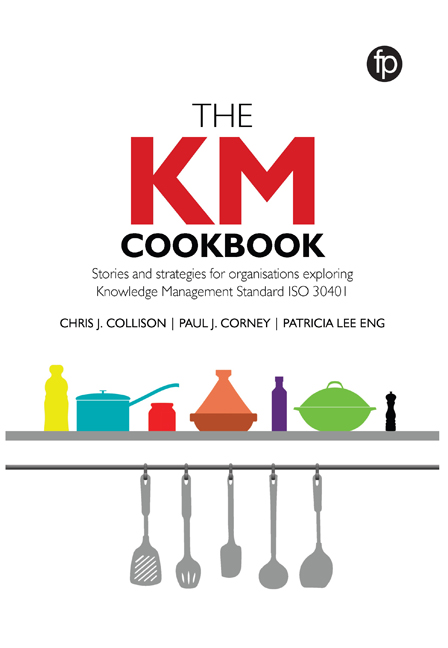 The KM Cookbook
The KM Cookbook Introduction
Published online by Cambridge University Press: 02 October 2019
Summary
Everybody loves a cookbook. A real cookbook, that is.
You see them on coffee tables, kitchen tables, ready to be idly thumbed through – or meticulously followed through.
For many people, they are a source of inspiration to dip into for that perfect main course or hard-to-think-of dessert. For others, they spark new ideas for twists and variations on somebody else's theme. For a few people, cooking through the entire book becomes a goal in its own right …
The 2009 film Julie and Julia was the first major motion picture to be written about a blog. In the film, based on a true story, Meryl Streep plays Julia Child, chef and author of the 1961 classic Mastering the Art of French Cooking, and Amy Adams plays Julie Powell, a young, frustrated New York writer and blogger with a passion for food. Julie decides to cook all 524 recipes from Child's book in 365 days and blog her experiences. As she progresses towards this impossible goal, her blog gathers momentum and Julie gathers followers (and some heated relationship challenges) as she ticks every recipe and shares her experience of ‘cooking out loud’ with an ever-growing community.
ISO 30401 is widely seen as the first international standard to be written for Knowledge Management. Based on the experiences of regional practitioners and consultants around the world, it set out to define a measurable framework to describe Knowledge Management from the perspective of a management system. The process gathered momentum, and numerous followers and commentators (and some heated philosophical differences), working out loud to enable public comment. The first version of the standard was published in November 2018.
When the three of us met in the summer of 2018 for the first time to discuss this new development in KM, there was already plenty of debate and some angst amongst the KM cognoscenti regarding the new standard. Some welcomed it, some feared it, and some just didn't know what to think about it!
We wanted to help dispel some of the myths, misunderstanding and misconceptions.
We wanted to find a way to explain and unpack the standard which would move it beyond a ‘ticking every recipe’ experience but make it an enriching experience for organisations considering the merits of accreditation.
- Type
- Chapter
- Information
- The KM CookbookStories and strategies for organisations exploring Knowledge Management Standard ISO 30401, pp. xi - xiiPublisher: FacetPrint publication year: 2019


